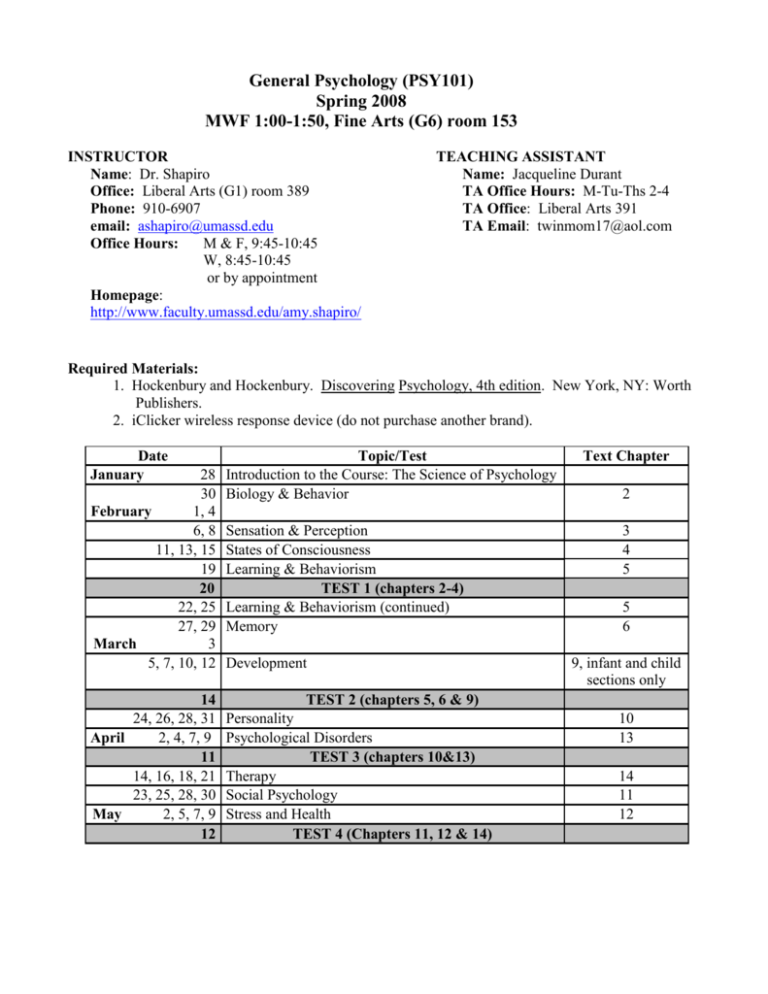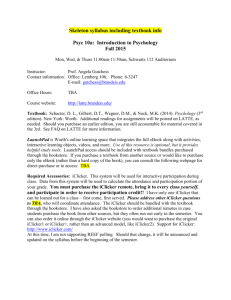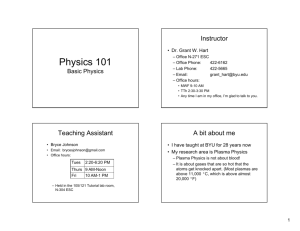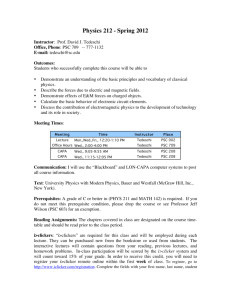General Psychology (PSY101)
advertisement

General Psychology (PSY101) Spring 2008 MWF 1:00-1:50, Fine Arts (G6) room 153 INSTRUCTOR Name: Dr. Shapiro Office: Liberal Arts (G1) room 389 Phone: 910-6907 email: ashapiro@umassd.edu Office Hours: M & F, 9:45-10:45 W, 8:45-10:45 or by appointment Homepage: http://www.faculty.umassd.edu/amy.shapiro/ TEACHING ASSISTANT Name: Jacqueline Durant TA Office Hours: M-Tu-Ths 2-4 TA Office: Liberal Arts 391 TA Email: twinmom17@aol.com Required Materials: 1. Hockenbury and Hockenbury. Discovering Psychology, 4th edition. New York, NY: Worth Publishers. 2. iClicker wireless response device (do not purchase another brand). Date January Topic/Test Text Chapter 28 Introduction to the Course: The Science of Psychology 30 Biology & Behavior 2 February 1, 4 6, 8 Sensation & Perception 3 11, 13, 15 States of Consciousness 4 19 Learning & Behaviorism 5 20 TEST 1 (chapters 2-4) 22, 25 Learning & Behaviorism (continued) 5 27, 29 Memory 6 March 3 5, 7, 10, 12 Development 9, infant and child sections only 14 TEST 2 (chapters 5, 6 & 9) 24, 26, 28, 31 Personality 10 April 2, 4, 7, 9 Psychological Disorders 13 11 TEST 3 (chapters 10&13) 14, 16, 18, 21 Therapy 14 23, 25, 28, 30 Social Psychology 11 May 2, 5, 7, 9 Stress and Health 12 12 TEST 4 (Chapters 11, 12 & 14) General Psychology (PSY101), Spring 2008 Course Policy, Procedures, Requirements and Grades IMPORTANT NOTICE TO ALL STUDENTS No exceptions to the policy explained in this document will be made. Any student who is unable to meet his/her responsibilities in this class or is uncomfortable with the policy is encouraged to drop the course through add/drop by February 1 or through a withdrawal by April 11. BY REMAINING ENROLLED IN THIS CLASS, STUDENTS ARE AGREEING TO THE TEST AND GRADING POLICY STATED IN THIS DOCUMENT. This document contains information about: 1. Course requirements and policies 2. iClicker Questions, Tests and Final Grades 3. How to Register Your iClicker 4. Study Guides, Tutoring, Office Hours and Help 5. The experiment participation requirement 6. Expectations for in-class behavior 7. Academic honesty 8. Your responsibilities in this class 9. Study tips 1. Course Requirements and Policies Final grades in this course will be based on 4 tests and the iClicker comprehension questions given in class each day. Two credit-hours of experiment participation is also required. Experiment participation is not formally graded but failure to complete this requirement will result in a grade of I (incomplete) for the course, which can be made up by participating in the next semester. There is no cumulative final exam in this class. Course averages will be calculated from the tests and iClicker questions. Students are required come to class every day with their iClicker. Any missed iClicker question, regardless of the reason, will be registered as a 0. Absolutely no make-ups will be given for the iClicker questions and no exceptions to this policy will be made, even with a doctor’s note or other documentation. Attendance is a requirement in this class. Any missed test, regardless of the reason for the student’s absence, will be registered as a 0. Bring a sharpened pencil, an eraser, and a pencil sharpener to all tests. Be sure to look over the syllabus and note the test dates. Inform your family not to schedule trips that will prevent you from taking tests. Do not schedule trips, work, or doctor appointments on these days. Absolutely no make-ups will be given for the tests and no exceptions to this policy will be made unless 2 or more tests are missed and ALL are documented by a medical doctor, court or relative’s death certificate. In other words, if a student fails to take a test for a non-medical/legal reason and misses another test for a medical/courtrelated reason, no make-up tests will be offered for either test. If documentation is provided, all but 1 test can be made up. One missed test will be dropped as the lowest grade. It is your responsibility to come to every test in case you have car trouble, are ill, are in court, etc. on the date of a later test. If a student lies to me about the reason for one or more missed tests or presents me with falsified documentation for one or more missed tests, ALL missed test grades will be entered into the final grade calculation as 0’s and the next highest grade will be dropped as the lowest grade. Any student who arrives late will not be granted additional time to finish a test or exam and will be graded on the amount of work completed during the scheduled test period. Any student who leaves a -2- test will be graded on the work completed prior to exiting the room. He or she may not return to finish the test. If a student misses an iClicker question due to a late arrival or early departure from class, no make-up will be offered. 2. iClicker Questions, Tests and Final Grades Each test is worth 100 points and the iClicker percent correct is calculated into the final grade as a proportion correct out of 50 (in other words, it’s equal to half a test grade or 50 points). The lowest test grade will be dropped so only the three highest test grades will be used in your final grade calculation. Each iClicker question is worth 1 point and the cumulative iClicker score will be converted to a proportion correct out of 50 at the end of the semester. The number of iClicker questions given over the semester is at the discretion of your professor, but there should be a minimum of 1 question each class. The scheduled tests are not cumulative; each will address only the material covered since the previous test. Each test will contain 50 multiple choice questions. The tests will cover the lectures and the text. The study guide and companion website come free with your textbook. I strongly encourage you to use at least one of these. It will help you to know which topics you understand and which you don't. I do not scale or curve grades. This is my way of assuring that you are not in competition with one another. It is to your benefit, then, to help one another and study together. To be sure my tests are fair, I do an item analysis after each test to be sure that there were no "bad" questions. A bad question is one that less than 25% of the class was able to answer correctly. If a question is bad, everyone in the class has its point value added to their test grade, even those who correctly answered it. This is my way of assuring that you are not penalized by an unfair test item. Final grades will be calculated by: (1) dropping the lowest test score (2) converting the iClicker points to a mean score out of 50 points (3) adding the iClicker score to the 3 remaining test scores (4) dividing by 350. Here are 3 examples of how grades are calculated: Example 1: If there are 60 iClicker questions during the semester, a student who earns 30 iClicker points and TAKES ALL THE TESTS, scoring 90, 82, 88 and 85, will have a class average of 82.3, which is a B-. It is calculated as follows: (1) The low test score of 82 is dropped. (2) The iClicker score is (30/60) x 50 = 25 (3) The mean score is: 90+88+85+25 =288 (4) 288 350 = .822 = B- (82.3%) Example 2: If there are 70 iClicker questions during the semester, a student who MISSES 1 TEST, scores 84, 86 and 88 on the other tests, and earns 68 iClicker points will have a class average of 87.5, which is a B+. It is calculated as follows: (1) The low score of 0 for the missed test is dropped. (2) The iClicker score is (68/70) x 50 = 48.5 (3) 84+86+88+48.5 =306.5 (4) 306.5 350 = .875 = B+ (87.5%) Example 3: If there are 70 iClicker questions during the semester, a student who MISSES 2 TESTS, scores 84 and 86 on the other 2 tests, and earns 50 iClicker points will have a class average of 68.7, which is an F. It is calculated as follows: -3- (1) (2) (3) (4) The low score of 0 for 1 of the missed tests is dropped. The iClicker score is (50/70) x 50 = 35.7 0+84+86+35.7 =205.7 205.7 350 = .587 = F (58.7%) Final grades will be awarded as follows: MEAN 100-96.5 96.4-92.5 92.4-89.5 89.4-86.5 86.4-82.5 82.4-79.5 79.4-76.5 FINAL GRADE A+ A AB+ B BC+ MEAN 76.4-72.5 72.4-69.5 69.4-66.5 66.4-62.5 62.4-59.5 59.4-0 FINAL GRADE C CD+ D DF 3. How to Register Your iClicker Before class on January 30, go to www.iclicker.com/registration Enter in the information asked for in each box. Be sure you have no typos! Most importantly, be sure to enter your student ID# accurately and completely with all the 0’s. There should be 8 digits (e.g., 00012345). After entering your first name, last name, student ID# and iClicker ID (serial) number you will be asked to type in a verification number/word printed on the page. This is a security measure. After entering that click the “Enter” button. Bring your iClicker to class on January 30 (and every day thereafter). You will be asked to use the iClicker to answer a registration question. After that is done, you will be able to use the iClicker to answer questions in class for credit toward your final grade. 4. Study Guides, Tutoring, Office Hours and Help I believe there are some used copies of the text in the book store. The publisher has packaged new copies with a study guide at no additional cost. The study guide has chapter summaries and a number of practice tests to help you study. The CD/website has a number of activities that will help you study. The CD may be used alone or you may log in to the web site listed in your book. Please take full advantage of office hours and come see me or your teaching assistant (TA) if you have any problems, concerns, comments, or questions concerning the class. Your TA’s hours will be announced in class. Anyone receiving a grade lower than "C" on any test should come see me or the TA as soon as possible. If office hours are inconvenient, you may make an appointment or reach me through email. My office hours, email address, etc. are provided on the syllabus. There are also tutors in the Writing and Reading Center on the second floor of the Group I building available at no cost to you. All of us are here to help you to get the most out of the material and the semester. The course is certain to be challenging and we are here to help make it enriching, as well. 5. Experiment Participation Requirement All members of this class are required to participate in 2 credit-hours of psychology experiments during the semester. Anyone who has not fulfilled this requirement will receive a grade of I (incomplete) for the course until the requirement is met. Although an incomplete can be made up through participation the following semester, I strongly encourage you to complete this portion of the course in a timely manner. An Incomplete in this course may jeopardize your student loan, -4- scholarship or financial aid. It is YOUR responsibility to be sure you complete the subject pool requirement and meet your financial obligations. No exceptions to this policy will be made, even if you are in danger of losing your aid or scholarship. Details about participation and how to meet the requirements are provided on a separate sheet, which you received with this one. An electronic copy is also available on Dr. Shapiro’s website. You can see what experiments are available and sign up for experiments on the subject pool web site: https://psyresearchpool.umassd.edu/ 6. Expectations for In-Class Behavior Because of the class size, students are easily distracted by extraneous noise, movement, etc. The class conduct policy has been created to facilitate everyone’s ability to hear and focus on the material. Failing to observe these rules is disrespectful of your classmates and the professor. So please be a “good citizen” and adhere to the following rules: Do not hold conversations during class. Turn off cell phones and beepers before class. Anyone whose communication device sounds off during class will be asked to leave. If you are more than 5 minutes late for class, do not come. Do not leave class early. If you can’t stay for the entire 50 minutes, do not come. Do not leave class and then come back. Be sure to eat, go potty, get tissues, make phone calls, etc. before class. Anyone in violation of these expectations will be asked to leave the classroom. 7. Academic Honesty Students are expected to adhere to the University policy on academic honesty, which you will find in the course catalog and on the University website. Anyone caught cheating (e.g., using notes, looking at another’s test, using an electronic device, etc.) will be failed in this course and brought up on University charges, even if the process jeopardizes graduation. If I find a student holding or in possession of more than 1 iClicker, I will assume the student is entering responses on behalf of a classmate. All iClickers in the suspected student’s possession will be confiscated to record the serial numbers and identify the students involved. The owners all the implicated iClickers will have all of their iClicker points erased for the semester and will have a score of 0 iClicker points entered into their final grade calculation. Although class members are encouraged to study together, everyone is expected to work alone on test days. The only allowed tools during tests are your brain, pencils, and an eraser. If a student lies to me about the reason for one or more missed tests or presents me with falsified documentation for one or more missed tests, ALL missed test grades will be entered into the final grade calculation as 0’s and the next highest grade will be dropped as the lowest grade 8. Personal Responsibility By enrolling and remaining in this class after add-drop period, you have agreed to the course policy stated in this document and explained on the first day of class. You are being given ample opportunity to succeed through a dropped test grade, the offer of tutoring, and item analyses for each test. For your part, you are expected to be responsible for your behavior and success in this class by studying, coming prepared to all classes and tests, living up to the University’s academic honesty policy, and being respectful of all class members. Please feel free to contact your professor or teaching assistant if you have any questions or concerns. However, please check this document first, as it answers most policy/grading questions. -5- 9. Study Tips A. There is s difference between understanding the material and KNOWING the material. You must know the material to do well on the tests, so you must spend time creating robust memories for the information covered in class and the text. To do so, I suggest that you vary the conditions of practice. In other words, don’t study by doing just one activity. Try doing all of the following before each test: (a) Every day after class, rewrite your notes in full sentences and organize the information appropriately. Doing so will revel points of confusion to you. Clarify these with the book or by asking questions in class or outside of class. (b) Create detailed flashcards and use them to memorize information. (c) Explain course information out loud, in your own words, to your room mate, parent, or bed post. Until you can explain it accurately and clearly, you don’t really know it. (d) Try to integrate what you're studying with what you already know. Relate course material to your own personal experiences. (e) Use the study guide. Study using the tips listed above then take one practice test. Note the questions you got wrong and go back to re-study that material in the book and your notes. Repeat the process until you run out of practice tests. (f) Use the student activities website/CD to engage yourself with the materials. B. When you take the tests, cover the possible choices and just read the question. Be sure you understand exactly what the question is asking for. Imagine your flash cards that are relevant to the question. Try to come up with the answer on your own. If the answer you choose is one of the choices, it is likely to be the right one. If not, consider each choice within the context of your interpretation of the question and what you know about the topic. C. Get into the habit of actively studying each day. Studying 1 hour a day for 8 days is MUCH more effective than studying 8 hours the day before a test. D. Choose a quiet, non-distracting place to study. However, try to vary where you study rather than always being in the same place. E. Occasionally, study with a friend. Quiz each other, compare notes and discuss discrepancies. F. When you feel yourself losing focus, switch the type of task you are working on, the subject that you are studying, or the environment that you are in. Take a break. G. Study just before going to sleep. H. Get enough sleep each night. Talk and laugh with friends over a meal each day. Have a little fun on the weekends. Get some aerobic exercise 3-4 times a week. -6-







